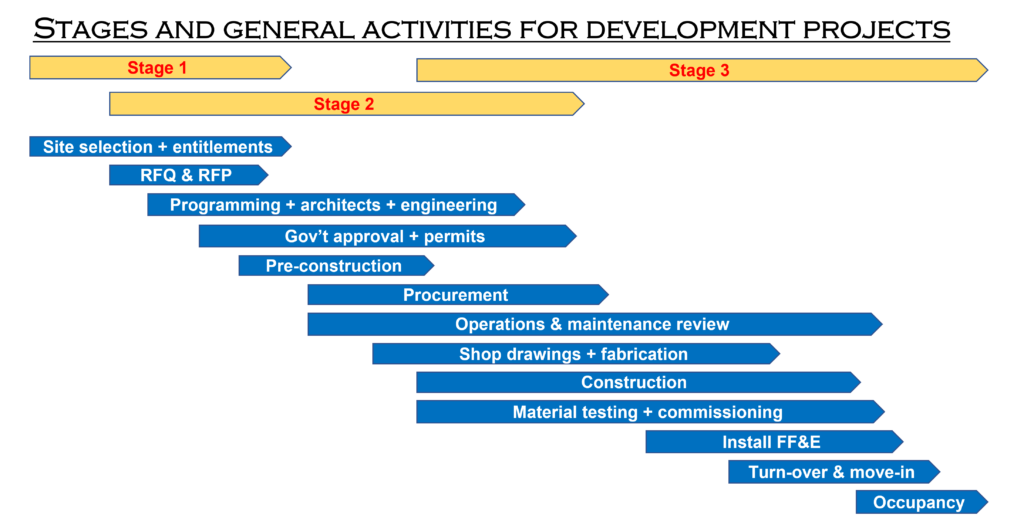Dianegrinman Group Summary of the Real Estate Development Process
Real estate development is about taking concepts and ideas and then turning them into a project that fulfills a need and/or meets a business objective. The development process is intricate, time-consuming, and involves a wide variety of professionals all brought together by the Developer and their development team. The developer is the voice/champion of the project and the leader of the team, but they are not typically the majority owner or majority investor.
Real estate development can be divided into three main stages: Stage 1 – Development: Stage 2 – Pre-construction, contracts, site plan, program, and design: And stage 3 – Construction, close-out, and move-in. Each stage has multiple substages; the main stages will overlap by several months, if not years. The main stages and processes generally described below are intended to provide an overview of the real estate development process. It is not intended to be a detailed road map on how to complete a real estate development; they are very complex and take years to successful completion.
Stage 1 – Development management/project planning
Stage 1 is the cornerstone of every successful project; this is where the project goes, or no go is ultimately decided. This stage is critical to the success of any project and consists of a wide variety of items, including project inception, ownership and investor structure, site selection and development team, best use of land, proforma analysis, diligence & research, define business goals & objective, demographic & urban analysis, feasibility study & market analysis, environmental studies, entitlements, and zoning.
Stage 2 – Site plan, programming, and design
Developing great RFQs / RFPs in stage 2 is critical to acquiring the right team for the project. Stage 2 requires a variety of design professionals, all working towards delivering a best-in-class development project that meets or exceeds the business objectives of the developer/owner/client with the highest quality finishes at the lowest possible cost. This stage consists of RFQ/RFP for services, negotiating contracts, site plan approval & define the program, planning, design & engineering oversight, construction pre-planning & estimates, final capital cost budget, operations & maintenance review, government approvals & permits, retail fit-up coordination, marketing/leasing strategy.
Stage 3 – Pre-construction / construction, close-out, and move-in
Stage 3 will overlap Stage 2 significantly and consists of identifying and hiring the best-qualified construction manager (CM) firm with experience building similar projects in size and complexity. The CM should be a valued team member, not an adversary. The developer shall monitor subcontractor bidding, oversee construction manager, infrastructure & utility coordination, risk & claim assessment/mitigation, oversee/manage budget & schedule, cause architect to provide timely information, change order review and creative issue resolution, coordinate testing and commissioning, punch list, as-built drawings, warranties & guarantees, certificate of occupancy, Owner move-in.

